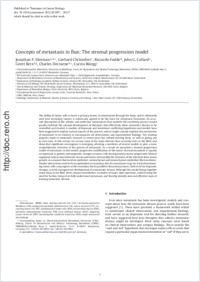Concepts of metastasis in flux: the stromal progression model
- Sleeman, Jonathan P. Universitätsmedizin Mannheim, University of Heidelberg, Germany - KIT Karlsruhe Campus Nord, Eggenstein Leopoldshafen, Germany
- Christofori, Gerhard Department of Biomedicine, Institute of Biochemistry and Genetics, University of Basel, Switzerland
- Fodde, Riccardo Department of Pathology, Josephine Nefkens Institute, Erasmus MC, Rotterdam, The Netherlands
- Collard, John G. Division of Cell Biology, The Netherlands Cancer Institute, Amsterdam, The Netherlands
- Berx, Geert Unit of Molecular and Cellular Oncology, Department for Molecular Biomedical Research, Ghent, Belgium - Department of Biomedical Biology, Ghent University, Belgium
- Decraene, Charles Translational Research Department, Institut Curie, Paris, France - CNRS, UMR144, Paris, France
- Rüegg, Curzio Pathology, Department of Medicine, Faculty of Science, University of Fribourg, Switzerland
-
21.02.2012
Published in:
- Seminars in Cancer Biology. - 2012, vol. 22, no. 3, p. 174-186
Metastasis
Seed and soil
Clonal selection
Parallel progression
EMT
Cancer stem cell
Metastatic niche
Microenvironment
Stromal progression
English
The ability of tumor cells to leave a primary tumor, to disseminate through the body, and to ultimately seed new secondary tumors is universally agreed to be the basis for metastasis formation. An accurate description of the cellular and molecular mechanisms that underlie this multistep process would greatly facilitate the rational development of therapies that effectively allow metastatic disease to be controlled and treated. A number of disparate and sometimes conflicting hypotheses and models have been suggested to explain various aspects of the process, and no single concept explains the mechanism of metastasis in its entirety or encompasses all observations and experimental findings. The exciting progress made in metastasis research in recent years has refined existing ideas, as well as giving rise to new ones. In this review we survey some of the main theories that currently exist in the field, and show that significant convergence is emerging, allowing a synthesis of several models to give a more comprehensive overview of the process of metastasis. As a result we postulate a stromal progression model of metastasis. In this model, progressive modification of the tumor microenvironment is equally as important as genetic and epigenetic changes in tumor cells during primary tumor progression. Mutual regulatory interactions between stroma and tumor cells modify the stemness of the cells that drive tumor growth, in a manner that involves epithelial–mesenchymal and mesenchymal–epithelial-like transitions. Similar interactions need to be recapitulated at secondary sites for metastases to grow. Early disseminating tumor cells can progress at the secondary site in parallel to the primary tumor, both in terms of genetic changes, as well as progressive development of a metastatic stroma. Although this model brings together many ideas in the field, there remain nevertheless a number of major open questions, underscoring the need for further research to fully understand metastasis, and thereby identify new and effective ways of treating metastatic disease.
- Faculty
- Faculté des sciences et de médecine
- Department
- Médecine 3ème année
- Language
-
- English
- Classification
- Biological sciences
- License
-
License undefined
- Identifiers
-
- RERO DOC 29135
- DOI 10.1016/j.semcancer.2012.02.007
- Persistent URL
- https://folia.unifr.ch/unifr/documents/302446
Statistics
Document views: 152
File downloads:
- pdf: 255
